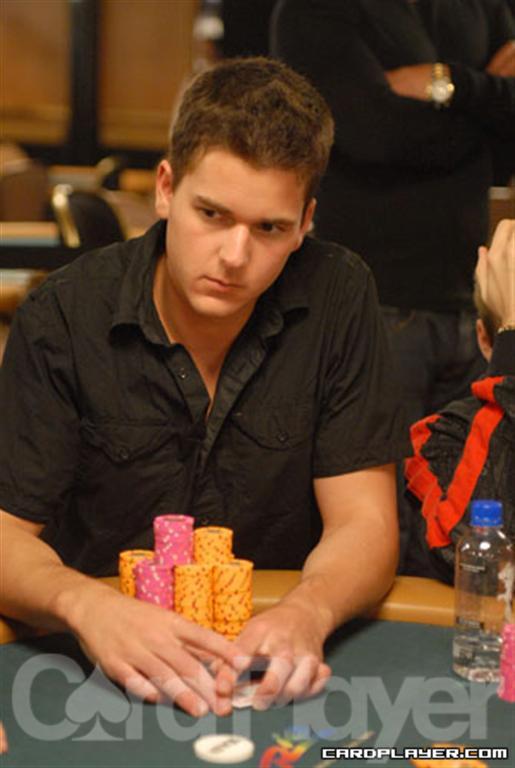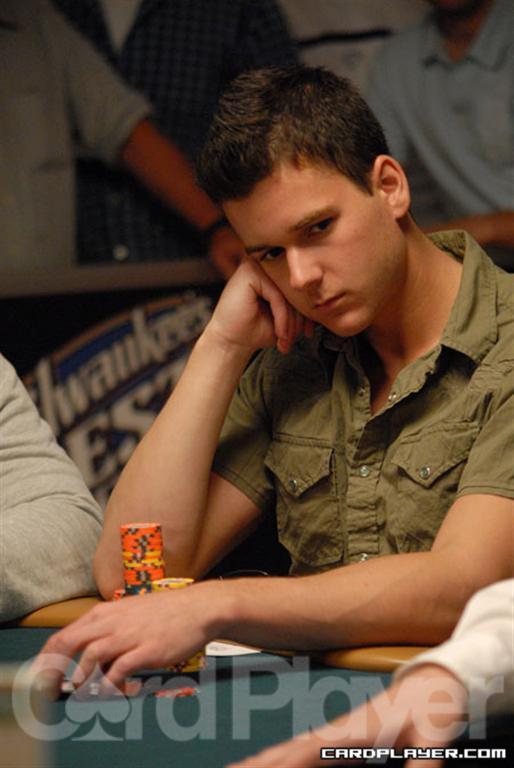






Run it Twice -- David BenefieldBenfield Talks Us Through a Pot-Limit Omaha Hand Against David Oppenheim |
|
|
 In this new series, Card Player sits down with high stakes pros to take a second look at a particular cash-game hand.
In this new series, Card Player sits down with high stakes pros to take a second look at a particular cash-game hand.
David Benefield is a 22-year-old from Fort Worth, Texas, who is widely known to the online-poker community as "Raptor." He is considered one of the most feared cash-game players around, competing in the highest limits online poker has to offer, including the $500-$1,000 mixed half pot-limit Omaha and pot-limit hold’em game on Full Tilt.
On January 24, 2009, the lineup taking the seats in the Ivey Mix table was stacked full of pros. Despite the caliber of the players at the table, Benefield described the tone of the game as a bit passive. He sat down with Card Player to discuss an interesting hand that came up during a round of pot-limit hold’em.
The Game
Date: Jan. 24, 2009
Type: Cash games
Game: Pot-limit Omaha
Table: Ivey Mix
Blinds: $500-$1,000
The Lineup
Seat 1: tsarrast ($26,485)
Seat 2: David Oppenheim ($118,145)
Seat 3: OnTheRize ($18,500) -- Dealer
Seat 4: John Juanda ($35,347) -- Small blind $500
Seat 6: trex313 ($124,985.50) -- Big blind $1,000
Seat 7: David Benefield (71,482.50)
Seat 9: Gus Hansen -- Sitting out
Run it Twice -- Review of the Hand
Preflop Action: Benefield opens the pot under the gun to $2,250 with A 10
10 J
J 9
9 . David Oppenheim and OnTheRise call behind him, as does John Juanda from the big blind.
. David Oppenheim and OnTheRise call behind him, as does John Juanda from the big blind.
Kristy Arnett: Let’s start off with your raise preflop. Do you often make smallish raises like this?
David Benefield: The raise size was mainly because of the stack sizes to act behind me. Tsarrast had $26K behind me, OnTheRise had $18.5K. Generally, I adjust my raise size based on the stacks. If there are smaller stacks behind me, I open a little bit smaller.
Flop Action: The flop comes 10 2
2 5
5 . Juanda checks, and Benefield bets $6,000. Oppenheim calls and everyone else folds.
. Juanda checks, and Benefield bets $6,000. Oppenheim calls and everyone else folds.
KA: You flop top pair on a fairly dry board. After Juanda checks, you lead out $6,000. What are you trying to accomplish with this bet?
 DB: The thing with this bet is that I have top pair and a backdoor-nut-flush draw and a backdoor-straight draw. I plan on bet-folding if I get raised by Oppenheim, and just getting all in against any other guys, since they have shorter stacks. Against the shorter stacks, if I bet and they go all in, I’m never going to be worse than 40 percent on average, I’m guessing, since their push range includes two-pair hands no matter what they are, a lot of A-3-4-6 type wraps, and obviously their sets. Of course, I’m behind sets and I’m going to have to try pretty hard to suck out [laughing], but I think, on average, I’m going to be about 40 percent if I get it in against shorter stacks. Overall, my hand plays fine for up to however much money John Juanda has. I’m happy to get it in with any of the other guys, but if Oppenheim pops it, I’m probably just going to fold, because his range is going to be much tighter than the guys who are shorter and are OK with gambling a little bit. It’s definitely a flop I need to bet.
DB: The thing with this bet is that I have top pair and a backdoor-nut-flush draw and a backdoor-straight draw. I plan on bet-folding if I get raised by Oppenheim, and just getting all in against any other guys, since they have shorter stacks. Against the shorter stacks, if I bet and they go all in, I’m never going to be worse than 40 percent on average, I’m guessing, since their push range includes two-pair hands no matter what they are, a lot of A-3-4-6 type wraps, and obviously their sets. Of course, I’m behind sets and I’m going to have to try pretty hard to suck out [laughing], but I think, on average, I’m going to be about 40 percent if I get it in against shorter stacks. Overall, my hand plays fine for up to however much money John Juanda has. I’m happy to get it in with any of the other guys, but if Oppenheim pops it, I’m probably just going to fold, because his range is going to be much tighter than the guys who are shorter and are OK with gambling a little bit. It’s definitely a flop I need to bet.
KA: When Oppenheim just calls and is the only one to do so, how are you reevaluating, and what kind of hand are you putting him on?
DB: I think when he calls, I can pretty much rule out set-type hands. It’s a pretty dry board, and I feel like most people, when they have a set in that spot, they are just going to pot it or at least make some kind of raise. I feel like he could have 10-5, 10-2, 5-2, or a hand like A-3-4-6, but I kind of feel like he’d raise that too, though. Again, I don’t have a ton of experience with him. I’m not really sure how he plays. I know he’s primarily a live player. He does play in the high games, but he also plays a lot of limit, and I’m not exactly sure how that is going to influence his decisions in a big pot-limit Omaha game. I put him on not a super great hand -- straight draws or weak two pairs.
Turn Action: The turn is the 7 . The board reads 10
. The board reads 10 2
2 5
5 7
7 . Benefield fires another barrel of $15,600. Oppenheim calls.
. Benefield fires another barrel of $15,600. Oppenheim calls.
KA: The turn brings you a two-way nut draw, the nut flush and the nut straight with an 8. You bet pretty strong. Are you committing yourself to the hand?
DB: Yeah, I am. After I bet the turn, there is absolutely no way I can get away from it. If he does ship it, I’m generally behind, but there is so much money in the pot. I can’t really bet-fold in that spot. My decision on the turn was to either check-raise or to bet and get it in. I’m playing that situation for stacks every single time. I’ve got top pair, the nut-flush draw, and a gutshot-straight draw to the nuts. I have a pretty strong hand, at this point. It’s not great, but it has a ton of equity and I can suck out against stronger hands.
KA: Why did you decide to bet instead of try to check-raise?
DB: I thought my hand did have quite a bit of value. I didn’t want to give him a free card on his 3-4-6 type wrap. He actually will, I think, fold a hand like 10-2 or 10-5 in that spot, which has pretty good equity against me. I felt he’d fold a weaker two-pair-type hands and also shove some hands weaker than mine, so it was definitely a value-bet.
River Action: The river is the 8 , giving Benefield a jack-high straight. The board reads 10
, giving Benefield a jack-high straight. The board reads 10 2
2 5
5 7
7 8
8 . Benefield bets all in for $47,632.50, and Oppenheim quickly folds. Benefield wins the pot of $53,197.
. Benefield bets all in for $47,632.50, and Oppenheim quickly folds. Benefield wins the pot of $53,197.
KA: You river your gutshot for the nuts. After you went all-in, Oppenheim folded. Do you regret making that play on the river?
DB: Yeah, I think I should have checked. The thing about the river is, with a shove, I’m only getting called by hands that would go all in anyway if I checked, and I miss giving him the opportunity to bluff. He’s going to bluff some of the time, but he will always fold if I shove, so I think there is more value in checking. If he’s calling the flop with 10-5, 10-2, or any two-pair hands, he’s probably folding those to a river shove anyway, because there’s absolutely nothing he can beat. If he did backdoor a 6-9 or 6-4, he’s going to shove when I check it.
Benfield is a lead instructor on at Card Runners, a poker training service that provides in-depth instruction. Videos and blog entries by Benefield can be found on CardRunners.com.
